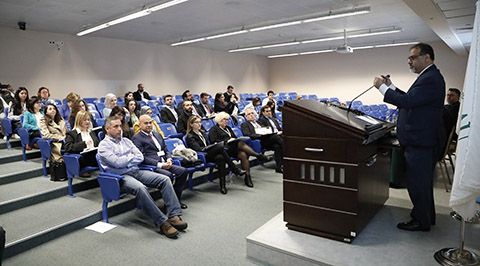The Impact of New Technologies on Sustainability and Innovations
The Adnan Kassar School of Business hosts a paper development workshop on the impact of new technologies on sustainability and innovations.
In this era of digital transformation, national and multinational corporations in emerging markets rely heavily on new technologies developed by global enterprises to help them run at their best.
Aiming to advance the theoretical approach behind the functioning and nature of such corporations, the Adnan Kassar School of Business organized a professional paper development workshop on the Endogenous Management Practices and Impact of New Technologies on Sustainability and Innovations in Emerging Markets.
Led by the editor-in-chief of the British Journal of Management, Geoff Wood, and assisted by three senior editors of top journals, the workshop consisted of various activities including a paper development workshop with a selected full-paper submission and topic table discussions.
Insight into publishing standards for research papers is crucial to contributing and getting proper recognition, and it is partly through such workshops that LAU optimizes its research potential, and its pursuit of innovation and sustainable development.
“We have reached out far to innovate new realizations for a more sustainable environment, promote scholarship and research, and endorse a culture of innovative thinking,” explained LAU Lead Career Advisor Dania Makki Saad, pointing out that sustainable development has already been implemented in four key areas: the curriculum, research, and social and environmental actions.
Along these lines, LAU recently launched the Fouad Makhzoumi Innovation Center– a hub that encourages and supports entrepreneurship and innovation in research and practice – and in 2018 the SAP’s Young Professional program, which serves to enhance students’ prospects.
Commenting on the latter, LAU alumnus Tarek Dalloul (BS ’02, MBA ’04)and director of the Levant Channel & Ecosystem at SAP Middle East & North Africa, stressed the importance of bridging the gap between the academic and corporate sectors. “In 2015, Lebanon and the MENA region scored the highest unemployment rate in the market which led to SAP introducing the Young Professional Program in many emerging markets, specifically the so-called countries at risk, to help cover the gap of talent in the marketplace,” he said.
When it comes to contributing research, Dr. Wood – who is also dean of Essex Business School in the UK – and Associate Professor at Khalifa University Vijay Pereira focused on “novelty” and “data quality” for the purpose of publication.
“The most important aspect we, editors, focus on is novelty,” Dr. Wood said. “Different journals define novelty in different ways; some are more conservative on its theories while others define it as identifying and investigating a theoretical tension.”
Cautioning workshop participants on the proper use of data, he added, “Be careful how it is described and presented. Give the reader the ultimate confidence that you’re aware of the subject reported and always attach a description of how you got your results.”.
For Dr. Pereira, a topic is not automatically considered unique just because it has not been done before. “What needs to be watched out for is data,” he said. “Journals are skeptical of using the same data again, therefore the latter should be as transparent as possible.”
Getting one’s research published is a long process and requires perseverance, warned Dr. Pereira. “You have to be willing to get rejected and have the confidence to carry on. Don’t leave the editors or reviewers in suspense. Make it strong at the end and sign off well.”
